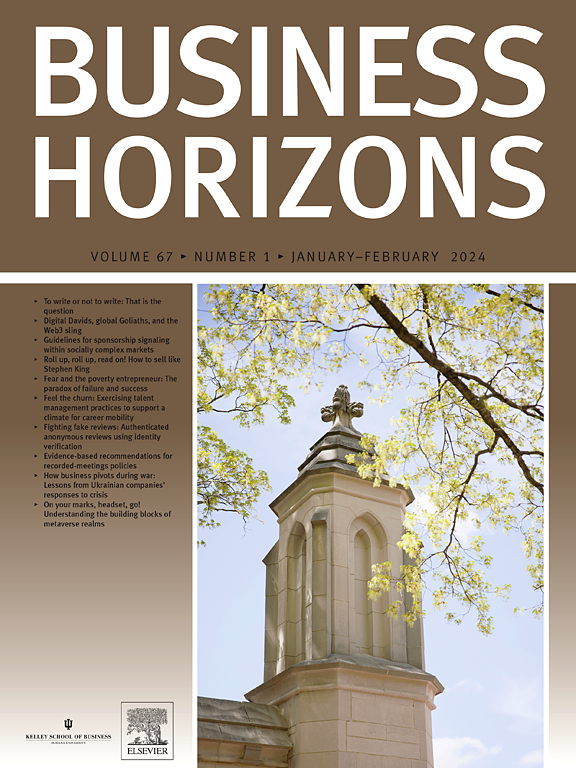“工作时才有和平”:坎帕拉的不安全和小企业生存
IF 7
3区 管理学
Q1 BUSINESS
引用次数: 0
摘要
全球南方的小企业是至关重要的社会和经济参与者。然而,许多人在不稳定的状态下运作,在非正式、不安全和有争议的政治环境中航行。本文结合小企业、企业家精神和政治经济学的观点,探讨了小企业如何应对城市不安全和政治暴力,以及它们在支持快速城市化和政治纷争城市的和平与发展方面可能发挥的社会作用。本文通过对微型、小型和中型企业(MSMEs)、所有者的半结构化访谈,以及对政治、商业和学术界关键线人的访谈,考察了乌干达坎帕拉两个地区的小企业代理机构、集体行动和不安全经历。我们的研究结果表明,中小微企业通常将不安全感与和平概念化在经济和个人方面,而不是与暴力的存在与否有关。此外,虽然中小微企业有采取集体行动解决这些问题的空间,但它们在代理方面也受到城市政治经济更广泛性质的限制。最后,我们讨论了对城市政策和管理实践的影响。本文章由计算机程序翻译,如有差异,请以英文原文为准。
“Peace is when we are working”: Insecurity and small business survival in Kampala
Small businesses in the Global South are vital social and economic actors. Yet many operate in a state of precarity, navigating informality, insecurity, and contentious political contexts. Connecting small business, entrepreneurship, and political economy perspectives, this article considers how small businesses negotiate urban insecurity and political violence and the social roles they may play in supporting peace and development in rapidly urbanizing and politically contested cities. Drawing on semistructured interviews with micro, small, and medium enterprises (MSMEs), owners, and interviews with key informants in politics, business, and academia, this article examines small business agency, collective action, and experiences of insecurity in two districts in Kampala, Uganda. Our results suggest that both insecurity and peace are often conceptualized in economic and personal terms by MSMEs rather than in relation to the presence and absence of violence. Moreover, while there is some scope for collective action by MSMEs to address these conditions, they are also constrained in their agency by the broader nature of the political economy of the city. We conclude by discussing implications for urban policy and management practice.
求助全文
通过发布文献求助,成功后即可免费获取论文全文。
去求助
来源期刊

Business Horizons
BUSINESS-
CiteScore
17.70
自引率
5.40%
发文量
105
期刊介绍:
Business Horizons, the bimonthly journal of the Kelley School of Business at Indiana University, is dedicated to publishing original articles that appeal to both business academics and practitioners. Our editorial focus is on covering a diverse array of topics within the broader field of business, with a particular emphasis on identifying critical business issues and proposing practical solutions. Our goal is to inspire readers to approach business practices from new and innovative perspectives. Business Horizons occupies a distinctive position among business publications by offering articles that strike a balance between academic rigor and practical relevance. As such, our articles are grounded in scholarly research yet presented in a clear and accessible format, making them relevant to a broad audience within the business community.
 求助内容:
求助内容: 应助结果提醒方式:
应助结果提醒方式:


